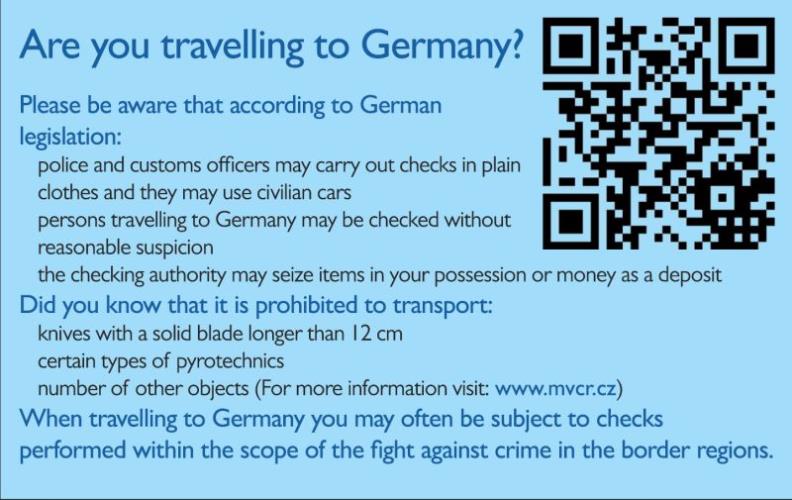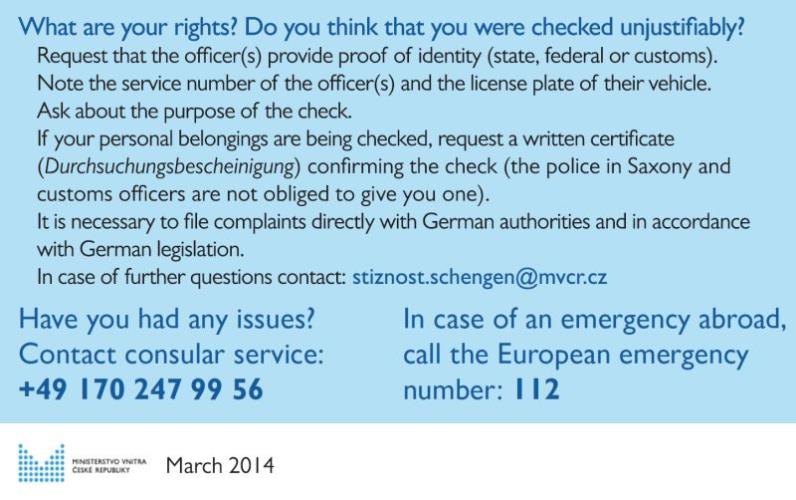Checks and Selected Procedural Aspects
Stopping and Checking a Vehicle
German police authorities are authorised to stop vehicles throughout the territory of Germany at any time, although the police have the general authority to scrutinise a vehicle only in order to inspect the technical condition of the vehicle. Other vehicle checks (e.g. for the purpose of examining the objects being transported in automobile vehicle) may be carried out only if there is a suspicion that the person is perpetrating a crime or threatening safety in some other way.
Unlike the police authorities, the customs authorities are, in principle, authorised to stop vehicles only in near-border areas, i.e. at a distance of up to 30 kilometres from the border. However, in a near-border area, the customs authorities may also carry out vehicle checks without the existence of any suspicion that a crime is being perpetrated or that there is a threat to safety.
It should be pointed out that the German authorities need not always wear a uniform during a check and are allowed to carry out checks in “plain clothes”. If in doubt as to whether this is a genuine police officer or other authorised person, the person being checked may ask the person carrying out the control to prove their identity by showing their service card.
It generally applies that the person being checked does not have any right to make any recordings of a police check.
Checking a Person’s Identity
The police authorities are allowed to check the identity of a person only if certain legal requirements are met, similarly as in the Czech Republic.
However, in the federal states of Saxony and Bavaria, there is an exception according to which the police authorities are allowed to check the identity of a person in near-border areas and other selected places (such as highways) at their discretion.
Representative for Delivery and Obligation to Provide a Security Deposit
If a person is suspected of having perpetrated an offence in the territory of Germany and if further proceedings are to be conducted against them (meaning that the matter has not been resolved on the spot), the German authorities are authorised to request a foreign national who is not resident in the territory of Germany on a long-term basis to appoint a person referred to as a “representative for delivery” and to pay a security deposit to cover the costs of the proceedings.
A representative for delivery is a person living in the territory of Germany. The German authority usually proposes a German attorney-at-law, a court employee or a police official to be this person. If the citizen agrees with appointment of such a representative, all written documents will be delivered to the citizen through this representative. The representative will forward the written documents to the citizen by ordinary mail.
The problem associated with appointment of a representative for delivery is that written documents are deemed to have been delivered on the date of their delivery to the representative. Since most time limits for mounting a defence on behalf of the accused start from the date of delivery to the representative, such time limits are often much shorter in practice because a relatively long period time may elapse between the delivery to the representative in Germany and the subsequent forwarding and delivery to the citizen in the Czech Republic.
The accused can reject the request to appoint a representative for delivery but in that case, he or she must be prepared to pay the costs of delivery of judicial or administrative correspondence.
With respect to the obligation to provide a security deposit to cover the costs of proceedings, this obligation depends on the size of the anticipated fine and the costs of court proceedings if the person is suspected of committing a crime; in other cases, the security deposit usually amounts to 105 % of the anticipated pecuniary fine. If the person is unable or unwilling to pay this amount, his/her belongings, ultimately even his/her passenger car, may be confiscated from him/her to cover the costs of the proceedings.


Travelling to Germany - basic information